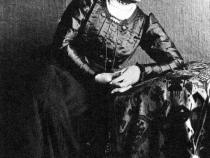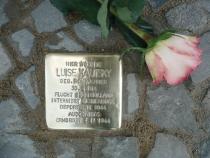Location
Windscheidstr. 31
District
Charlottenburg
Stone was laid
April 2009
Born
11 August 1864 in Wien
Deportation
in August 1944
to
Auschwitz
Dead
18 January 1945 in Auschwitz
She was in a terrible state, the excitement, transport and then just a few days in the camp in an overfilled block [...] were too much for the 80-year-old. [...] We weren't able to replace the straw bag with anything better, but several blankets were organised for her [...] and a small pillow. [...] The question of food was difficult, Frau Kautsky got a special diet, i.e. half a litre of semolina or oat soup and a third of a white loaf with 20 grams of jam three times a week. [...] She was so happy on the one hand to have met her son in Buna [...] but she was so upset that he knew she was in Auschwitz. [...] On 28th October 1944, the infirmary was transferred elsewhere and this proved to be the last straw for Luise Kautsky[...].“
Dr. Marie Adelsberger, a doctor in the infirmary at Birkenau, 1946
Luise Ronsperger was the daughter of a Jewish confectioner in Vienna. She worked in her parents’shop until her father's death. She became a socialist and turned away from Judaism. In 1890 she married Karl Kautsky, the famous socialist theoretician, and moved with him to Stuttgart. They had three sons. In 1897 they moved to Berlin, where her husband worked as editor of the Social Democrat magazine Neue Zeit while she translated socialist texts from English, French and Russian. She became close friends with Rosa Luxemburg but never agreed with her endorsement of the Soviet republic system of government. In 1917, Luise Kautsky joined the USPD, hoping for rapprochement with the SPD and a national assembly to create constitutional law. She wrote on 18.11.1918 that this must and will sort out a lot that has been done in initial haste. After Rosa Luxemburg's assassination, she published the letters she had sent from jail and writings to herself and Karl Kautsky and compiled a memorial book. She also collected Rosa Luxemburg's letters to others. In 1924, the family moved back to Vienna. After Austria’s annexation by Nazi Germany in 1938, they fled to Prague and then to Amsterdam, where Karl Kautsky died in October. Their oldest son Felix emigrated in 1938 to the US. Karl, their second oldest, was detained for six months but subsequently also managed to escape to the US via Sweden. Luise Kautsky stayed with the wife and children of her youngest son Benedikt in Amsterdam. He had been sent to Dachau concentration camp from Vienna in May 1938. Luise stayed in the Netherlands after its occupation by Germany in 1940 in the hope of maintaining contact with her son. She was arrested in August 1944 and deported to Auschwitz, where she died shortly afterwards. Benedikt Kautsky, who was interned in a sub-camp of Auschwitz at the time, survived and returned to Vienna. In 1950, he published the letters by Rosa Luxemburg that his mother had collected. The S-bahn arch between Kantstraße and Fasanenstraße in Wilmersdorf-Charlottenburg is named after Luise Kautsky. In 1999, Charlottenburg district council resolved to erect a plaque in her memory at Wielandstraße 26.
Luise Kautsky was a city councillor from 1920 – 1921; nominated for election (USPD).
Dr. Marie Adelsberger, a doctor in the infirmary at Birkenau, 1946
Luise Ronsperger was the daughter of a Jewish confectioner in Vienna. She worked in her parents’shop until her father's death. She became a socialist and turned away from Judaism. In 1890 she married Karl Kautsky, the famous socialist theoretician, and moved with him to Stuttgart. They had three sons. In 1897 they moved to Berlin, where her husband worked as editor of the Social Democrat magazine Neue Zeit while she translated socialist texts from English, French and Russian. She became close friends with Rosa Luxemburg but never agreed with her endorsement of the Soviet republic system of government. In 1917, Luise Kautsky joined the USPD, hoping for rapprochement with the SPD and a national assembly to create constitutional law. She wrote on 18.11.1918 that this must and will sort out a lot that has been done in initial haste. After Rosa Luxemburg's assassination, she published the letters she had sent from jail and writings to herself and Karl Kautsky and compiled a memorial book. She also collected Rosa Luxemburg's letters to others. In 1924, the family moved back to Vienna. After Austria’s annexation by Nazi Germany in 1938, they fled to Prague and then to Amsterdam, where Karl Kautsky died in October. Their oldest son Felix emigrated in 1938 to the US. Karl, their second oldest, was detained for six months but subsequently also managed to escape to the US via Sweden. Luise Kautsky stayed with the wife and children of her youngest son Benedikt in Amsterdam. He had been sent to Dachau concentration camp from Vienna in May 1938. Luise stayed in the Netherlands after its occupation by Germany in 1940 in the hope of maintaining contact with her son. She was arrested in August 1944 and deported to Auschwitz, where she died shortly afterwards. Benedikt Kautsky, who was interned in a sub-camp of Auschwitz at the time, survived and returned to Vienna. In 1950, he published the letters by Rosa Luxemburg that his mother had collected. The S-bahn arch between Kantstraße and Fasanenstraße in Wilmersdorf-Charlottenburg is named after Luise Kautsky. In 1999, Charlottenburg district council resolved to erect a plaque in her memory at Wielandstraße 26.
Luise Kautsky was a city councillor from 1920 – 1921; nominated for election (USPD).




